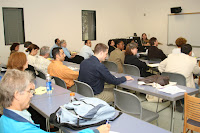 Poor Dees. I guess it's a case of wait 'til next year...
Poor Dees. I guess it's a case of wait 'til next year...Note: The "wooden spoon" indicates the team that comes last in the AFL home and away season.
 I recently saw this interesting graph from The New York Times, which shows the cost of education in the U.S. way, way, way outpacing everything else measured in terms of inflation.
I recently saw this interesting graph from The New York Times, which shows the cost of education in the U.S. way, way, way outpacing everything else measured in terms of inflation.I don't think Christians understand the depth of the stronghold evolutionists have in our system. They have engineered things to stop anything that we say, to report anything that we say.
 In my job as a professional science writer, I use no less than eight different software packages to get the job done. And that number is tending to go up, not down.
In my job as a professional science writer, I use no less than eight different software packages to get the job done. And that number is tending to go up, not down.
 Yup. It was a fake.
Yup. It was a fake.Two researchers bought the "carcass", encased in ice, for an undisclosed sum.
But as it thawed it turned out to be a rubber monkey outfit.
 I have no email in my main inbox.
I have no email in my main inbox. From a story in The Age:
From a story in The Age:One of the two samples of DNA said to prove the existence of the Bigfoot came from a human and the other was 96 per cent from an opossum, according to Curt Nelson, a scientist at the University of Minnesota who performed the DNA analysis.
Biscardi said the DNA samples may not have been taken correctly and may have been contaminated, and that he would proceed with an autopsy of the alleged Bigfoot remains, currently in a freezer at an undisclosed location.
The two men who claim to have found Bigfoot have admitted to filming a hoax video with a fake scientist, but they still claim they have a real Bigfoot corpse in the freezer and will reveal all at a press conference.
 US hunters claim they have found bigfoot.
US hunters claim they have found bigfoot.
 It took seven years.
It took seven years.
Science is like a good friend: sometimes it tells you things you don’t want to hear. It tells you the truth.
 Departments should remove conference presentations as a requirement of job performance.
Departments should remove conference presentations as a requirement of job performance.The difference between now and then, now being 2008 and then being, let's say, 1958, is in the distribution. With three TV channels, a local paper or two, a local radio station or two, everyone got the same serving of both news and entertainment. This was a "push" - the information is pushed onto the audience, who has to take it or go live in a cave. ...
Today, the media reality is that it is a "pull" model - there are so many outlets, hundreds of cable channels, increased numbers of magazine, millions of blogs, satellite radio, that everyone searches for information and entertainment they are interested in. And ignore the rest. ...
The only venue I can think of, the only place where "push" still works and people are literally forced to listen to things they personally don't care about - is school.
 If you're crossing a border into the United States, the government can take away anything electronic for any reason for any length of time and give the information on it to others.
If you're crossing a border into the United States, the government can take away anything electronic for any reason for any length of time and give the information on it to others. Memory is U shaped. Presentations should be W shaped.
Memory is U shaped. Presentations should be W shaped.Focussing in a way on the idea of mini-cliffhanger this seems to be a thing that lots of good movies have in common. If you imagine Bruce Willis making his way through the skyscraper in Die Hard, he has sort of intermittent battles with the terrorists, which kind of comes to our head at various points and then things calm down a bit and then a new cliffhanger builds up and he gets into another fight. ...
(W)eirdly enough that pattern also seems to happen in Casablanca, if you imagine, Humphrey Bogart and Ingrid Berkman's characters. They are not fighting obviously, but while they are in a way, they're, sort of, wrestling with their feelings and they are, sort of, drawn together and then apart and together and there is a, sort of, mini-cliffhanger's feeling there(.)
 Over in Time Higher Education, there's an article by Tim Birkhead of note. He writes:
Over in Time Higher Education, there's an article by Tim Birkhead of note. He writes:The scientific research councils seem to be obsessed by hypothesis testing.
The entire funding strategy by the research councils is risk averse.